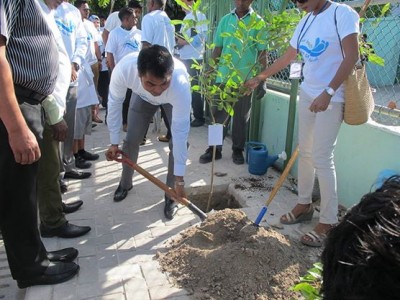Hope for Women has expressed concern about the portrayal of domestic violence in Maldivian media, following the publication of a controversial article this week regarding the sexual abuse of minors.
“At a time where the epidemic of sexual abuse has thoroughly established its claws in the society of Maldives, we are currently witnessing a media determined to re-victimize the victims of this tragedy,” said the women’s rights NGO.
The article in question, published by online news outlet Sun Online, suggested that underaged girls were abusing elements of the Child Sex Abuse (Specials Provisions) Act in order to engage in prostitution.
“Even if the girl is addicted to sex in prostitution cases, no action is usually taken against her,” read the article, which then suggested that some girls engage in prostitution due to an addiction to sex.
“The girl who engages in prostitution should also be arrested and brought to justice in the same way the person who pays for it is,” it continued.
“And that girl should not be released back into the society after the case is taken to the court, until a verdict is reached. Otherwise it is possible to see many such cases from her before the initial case reaches a verdict.”
Quoting a criminal lawyer named Adam Asif, the article said that there are cases where some girls accuse their family members of child abuse when they disagree with her choice of boyfriend.
Hope for Women have described the article as “irresponsible journalism” and its tone “very offensive”.
“The article blames the victims and instead of getting a fair public opinion, it deprives the rights of these victims and demeans their prestige and reputation. By focusing on the perpetrator, the article failed to fathom the grievance of the actual matter,” said the NGO.
“Hope for Women harshly condemns all such reports on media re-victimizing the victims.”
Reports of child prostitution in the Maldives were aired publicly for the first time last year by the then Minister of Family, Gender, and Human Rights Azima Shukoor.
“The number of children facing abuse at one point in time in the Maldives is a number that is unreasonable for a country with such a small population,” said Azima.
Speaking with Minivan News shortly after this news, clinical psychologist Dr Aishath Ali Naaz explained that child prostitution had become so “common” in some parts of the country that the underage victims considered it “normal”.
The practice, believed by multiple sources interviewed by Minivan News to be prevalent across the Maldives, ranges from male benefactors grooming children with ‘gifts’, to parents actively selling the sexual services of their children – some as young as 12.
A former island chief explained to Minivan News that there have been cases of middle aged or elderly men providing financial support to young girls for basic necessities “and then taking advantage of the position [of benefactor].”
Reported cases typically involved low income families “with four or five children,” he said, with adolescent girls aged 16-17 often targeted.
Hope for Women concluded it’s statement by calling for responsible authorities to monitor sensitive media reporting in order to “enhance justice” for survivors of violence.
“Also, we call every individual and the relevant authorities to take all the measures to prevent all forms of reporting that are misleading and irresponsible written on domestic violence.”
“We reiterate the fact that we all have a critical role to play, governments, independent institutions, civil society, young people, the media, religious groups and the corporate sector and most importantly, individuals for zero tolerance to domestic violence,” said Hope for Women.
